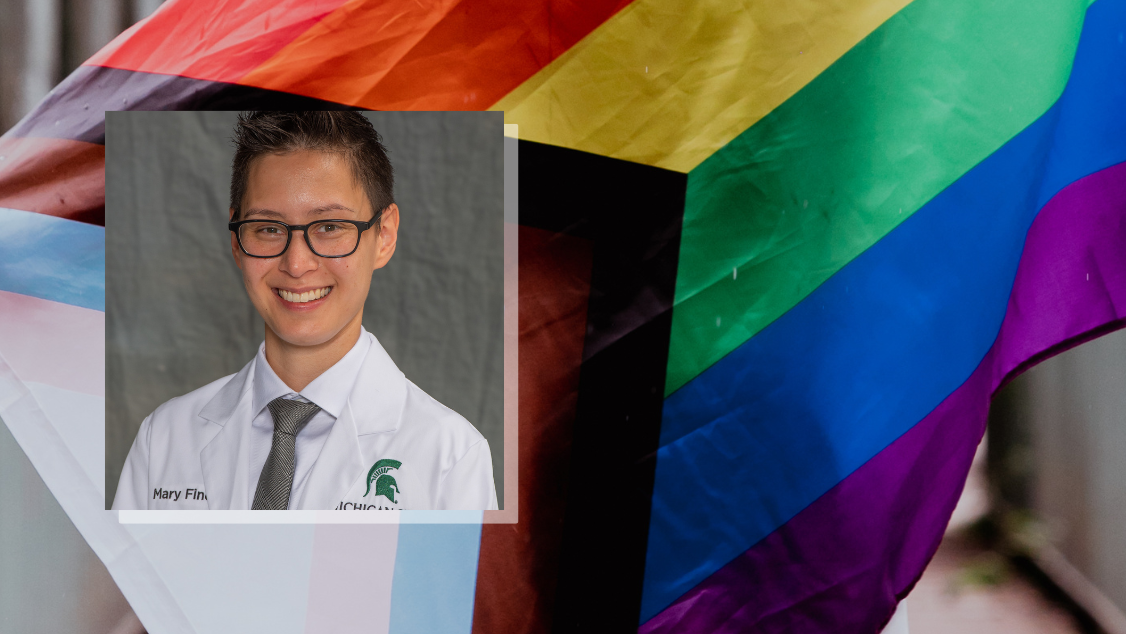Building a village around LGBTQIA+ youth
June 27, 2023
MSU medical student builds support program for LGBTQIA+ youth and those aging out of foster care
Warning: This story refers to situations that may trigger traumatic memories for members of our community. Resources and assistance are available through multiple campus programs.
 As an undergraduate at the University of Wisconsin, Mary Finedore volunteered at a clinic, where a resident physician asked her to witness a particularly sensitive examination. In the exam room, a 14-year-old girl was curled into a ball, mute, and severely traumatized after being sexually assaulted by her foster father.
As an undergraduate at the University of Wisconsin, Mary Finedore volunteered at a clinic, where a resident physician asked her to witness a particularly sensitive examination. In the exam room, a 14-year-old girl was curled into a ball, mute, and severely traumatized after being sexually assaulted by her foster father.
After the resident performed a pelvic exam, Finedore asked what they could do to help the girl. “We just did,” the resident answered, “and that’s all we can do.”
“I remember walking out of the room. I was so mad and shocked and scared for what would happen to this girl when she left,” Finedore recalled. “At that moment, I realized medicine wasn’t enough. When I walked out of the clinic that day, I promised myself and that little girl I would do all I could to help change the systems that failed her."
A decade later, backed by a grant from The Arnold P. Gold Foundation, Finedore, now a second-year College of Human Medicine student, created a pilot program to help such vulnerable youths. As a recipient of a 2023 Gold Student Summer Fellowship, she is training staff and volunteers in the CASA (Court Appointed Special Advocates for Children) of Kent County program to support LGBTQ+ youth and those aging out of foster care.
Finedore began building the program before the grant was approved. Eventually, she hopes to expand it to teachers and others who work with children.
As future physicians, “our job is to coordinate care and build a village around our patients,” she said, and to ask, “do you have a safe place to go home to, do you have food, do you need anything else?”
Thinking about the 14-year-old girl, she said, “none of those questions were asked.”
Studies have shown that 40-50 percent of homeless youth identify as LGBTQ+, including many who end up in foster care. They are particularly vulnerable to sexual assault, substance abuse, and mental health problems, including suicide.
Finedore teaches staff and volunteers about the disparities faced by LGBTQ+ youth and trains them in how to interview and provide them with resources. Youths about to age out of foster care are given pamphlets and training on financial literacy, navigating the health care system, and other topics necessary to survive on their own.
Finedore plans to continue her work as a primary care physician and psychiatrist. When she learned recently that the Gold Foundation had chosen her program for funding, “I cried,” she said. “I was absolutely thrilled. I feel so incredibly strong about this.”
She hasn’t forgotten the young girl whose trauma inspired her.
“I think about her every single day,” Finedore said. “If we are able to create some stability for these kids, that’s a good thing.”
Resources and assistance are available through multiple campus programs.

